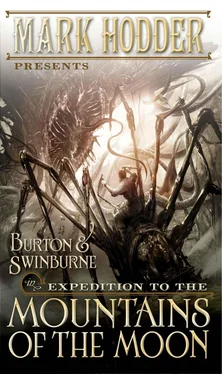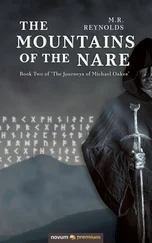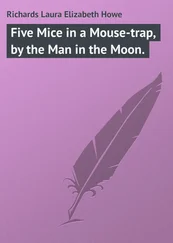Mark Hodder - Expedition to the Mountains of the Moon
Здесь есть возможность читать онлайн «Mark Hodder - Expedition to the Mountains of the Moon» весь текст электронной книги совершенно бесплатно (целиком полную версию без сокращений). В некоторых случаях можно слушать аудио, скачать через торрент в формате fb2 и присутствует краткое содержание. Жанр: sf_stimpank, на английском языке. Описание произведения, (предисловие) а так же отзывы посетителей доступны на портале библиотеки ЛибКат.
- Название:Expedition to the Mountains of the Moon
- Автор:
- Жанр:
- Год:неизвестен
- ISBN:нет данных
- Рейтинг книги:5 / 5. Голосов: 1
-
Избранное:Добавить в избранное
- Отзывы:
-
Ваша оценка:
- 100
- 1
- 2
- 3
- 4
- 5
Expedition to the Mountains of the Moon: краткое содержание, описание и аннотация
Предлагаем к чтению аннотацию, описание, краткое содержание или предисловие (зависит от того, что написал сам автор книги «Expedition to the Mountains of the Moon»). Если вы не нашли необходимую информацию о книге — напишите в комментариях, мы постараемся отыскать её.
Expedition to the Mountains of the Moon — читать онлайн бесплатно полную книгу (весь текст) целиком
Ниже представлен текст книги, разбитый по страницам. Система сохранения места последней прочитанной страницы, позволяет с удобством читать онлайн бесплатно книгу «Expedition to the Mountains of the Moon», без необходимости каждый раз заново искать на чём Вы остановились. Поставьте закладку, и сможете в любой момент перейти на страницу, на которой закончили чтение.
Интервал:
Закладка:
The gathered Baloch men cried out in amazement as their leader's weapon went spinning away, landing at the edge of the arena.
Darwaas stood stunned.
“The sword should be held against the body in defence,” Burton stated, “else, as thou saw, in being knocked backward, it can do as much damage as the attacking blade. Also, this means that, for the defender, the muscles of the shoulders, arms, and wrists are relaxed-are not employed in resisting the offensive-and are thus free to fully power the counterattack.”
Darwaas's face blackened. “Dost thou mean to humiliate me, dog?”
Burton shook his head. “I did not seek to fight thee, Jemadar. I desire only to-”
“Richard!” Swinburne shrieked.
Something impacted against the back of Burton's head. The world reeled around him and vanished.
A conflagration raged in his skull, needled his eyelids, clawed at his skin. He tried to move and found that he couldn't. Thirst consumed him.
He forced his eyes open and squinted up at the pitiless sun. Turning his head, he saw that he was on his back, with limbs spread out, his wrists and ankles bound with cord to wooden stakes driven deeply into the ground.
Dunes rose to either side.
He opened his mouth to shout for help but only a rattle emerged.
Grains of sand, riding a hot, slow breeze, blew against the side of his face.
He experienced a strange sense of deja vu.
Is this a dream?
Jemadar Darwaas entered his field of vision.
“Art thou comfortable?” he asked. “Thy head aches, I fancy? My moollah -lieutenant-struck thee with a knob stick.” The bandit chuckled. “By Allah, he knows how I hate to be bested! Thou art a fine swordsman, Abdullah! Mayhap the tales told of thy race are true, for it is said that the British are undefeated in battle. Praise be to Allah that the lands of my people have no resources that thy people covet!” Darwaas held his arms out wide as if to embrace the entire desert. He grinned wickedly. “Let us see,” he said, “how that land now judges thee, Britisher.”
He turned away and climbed to the top of a dune, looked back once, spat, then descended the other side of the mound and passed out of sight.
Burton felt his flesh cracking.
It was mid-afternoon and the heat wouldn't abate for at least another three hours. If he survived it, he'd then have to endure the severe chill of night.
He moved his tongue in his mouth. It felt like a stone.
There was a spell of nothingness.
He sucked in a burning breath and realised that he'd been unconscious.
Think. Think, and hang on to the thoughts. John Speke and Count Zeppelin obviously stopped here and warned the bandits to look out for a crashed rotorship and to kill any survivors. How far ahead are they? Already at Aden, perhaps?
Think, and keep thinking!
Awareness slipped to one side and skidded into oblivion.
Awake.
Where?
He tried to form words, to call for help, but the slightest movement of his mouth increased the pain a thousandfold. The agony flared; an unbearable brilliance.
He sank into the centre of an inferno.
Flames.
Flames in a stone bowl hanging by chains from a ceiling so high that it is lost in shadows. Columns. A monolithic temple. It is on a hill in the centre of Kantapuranam, the capital city of Kumari Kandam, the land of the reptilian Naga.
A man steps forward.
He is Brahmin Kaundinya, and he is wedded to the monarch's daughter, their union a symbolic pact to mark the end of conflict between the lizard race and humans. He has lived a year among them, and is now standing before K'k'thyima, the high priest.
Thin blue smoke from burning incense curls around the human's legs. Onlookers watch attentively. There are at least a thousand of them gathered in the temple, and many millions more in attendance mentally but not physically.
The man bows his respect to the priest.
“Not to me, soft skin,” K'k'thyima hisses. “To the Joined.” With a three-fingered clawed hand, he gestures to his right.
Kaundinya turns to a huge black diamond, which rests on a plinth of gold.
One of the three Eyes of Naga.
Kaundinya bows again.
K'k'thyima says: “Thy wife may step to thy side.”
The man turns around to look at his mate. “Come, and speak for me, that all may know my character,” he says, following the ritual.
She moves to him. Like all of her race, she is about half his height; her skin segmented into a mosaic of leathery black, yellow, and green; her limbs short and thick; her head confusing to the human, for sometimes it seems to be one of seven heads, other times one of five, and occasionally the sole one. She is wearing extravagant jewellery and a chain-mail tunic.
“Husband,” she says, “I am willing to speak.”
The high priest, who also appears to have multiple heads, orders a human prisoner to be brought forward. As the man is escorted to the plinth, Kaundinya is addressed.
“Thou came as an emissary, O Kaundinya. Thou came to broker peace between the race of soft skins and the race of Naga. Thou hast lived among us as one of us, and thou hast been husband to Kuma K'sss'amaya.”
He turns to the female.
“Hast thou, my Kuma, been satisfied with the conduct of thy husband?”
“I have,” she answers. “With intervention from our wise ones, that which divides our species was bridged, and the human gave to me a child. He is an attentive and dutiful father. He has respected our ways. He has learned much and has not judged. He brings peace.”
The crowd emits an approving sibilance.
Kaundinya watches the high priest. A single head swims into focus. Its yellow eyes blink, their membranes sliding sideways: a sign of satisfaction. The head blurs. There are seven heads. There are five. There is one. There are seven.
“Pay honour to the Joined,” K'k'thyima orders.
A blade slices through the prisoner's neck and his blood spurts over the irregular facets of the giant gemstone. He convulses and dies and his corpse is dragged out of the chamber.
“A sacrifice is always necessary, O Kaundinya, but the essence of he who gave his life will live on in the Eye.”
The priest performs a number of ritualistic gestures, almost a dance, and intones: “The multitude are one. Individual thoughts are one thought. Separate intentions are one intention. The words of one are the words of all. The days that have been and the days that will come are eternally now.”
He steps to the stone, leans over it, and, with one of his long forked tongues licks blood from its surface. He then dips the same tongue into a bowl containing black diamond dust.
With the organ extended, he returns to Kaundinya-who bows down-and runs it delicately over the human's shaven scalp, leaving a swirling, glittering hieroglyph.
K'k'thyima steps back. Kaundinya straightens.
The High Priest says: “Thou art invited into the Great Fusion, O Emissary. Dost thou accept the Joining?”
“I accept.”
The crowd emits a throbbing susurration, a repetitive refrain. All the gathered priests extend and quiver their multiple neck crests, a dazzling display of vibrating colour.
From somewhere, a throbbing rhythm pulses and a melody of heart-wrenching beauty swells through the temple. Layer after layer is added to it. Its refrains are bafflingly complex, and they are constructed from tones that no human instrument has ever produced; tones that no human being can even properly comprehend.
Kaundinya tries to meet K'k'thyima's eyes but is unable to focus on any single head. He feels the music and the lizard's mesmeric power overwhelming all but one tiny and very well-concealed part of his consciousness, and he allows it.
Читать дальшеИнтервал:
Закладка:
Похожие книги на «Expedition to the Mountains of the Moon»
Представляем Вашему вниманию похожие книги на «Expedition to the Mountains of the Moon» списком для выбора. Мы отобрали схожую по названию и смыслу литературу в надежде предоставить читателям больше вариантов отыскать новые, интересные, ещё непрочитанные произведения.
Обсуждение, отзывы о книге «Expedition to the Mountains of the Moon» и просто собственные мнения читателей. Оставьте ваши комментарии, напишите, что Вы думаете о произведении, его смысле или главных героях. Укажите что конкретно понравилось, а что нет, и почему Вы так считаете.












